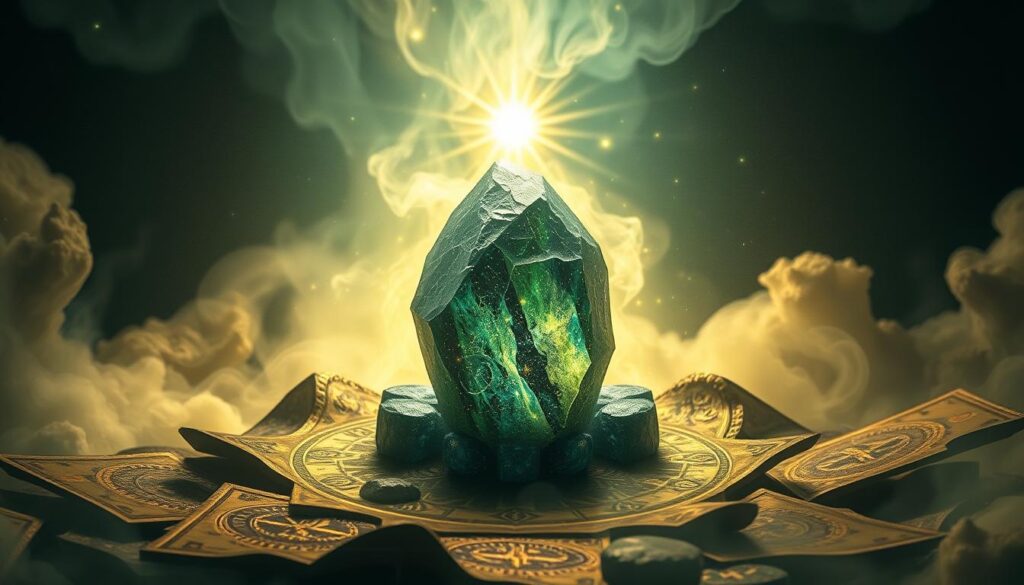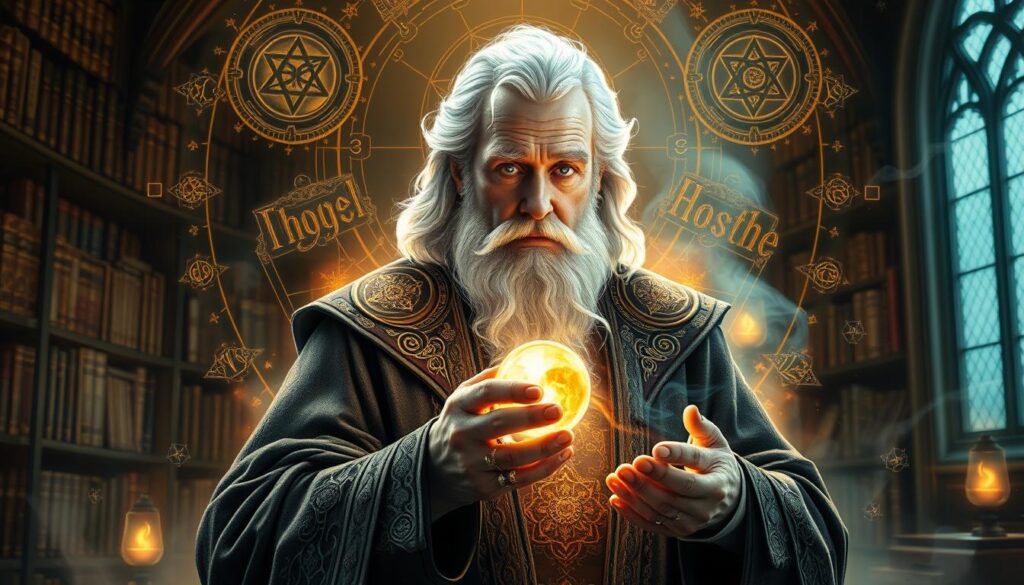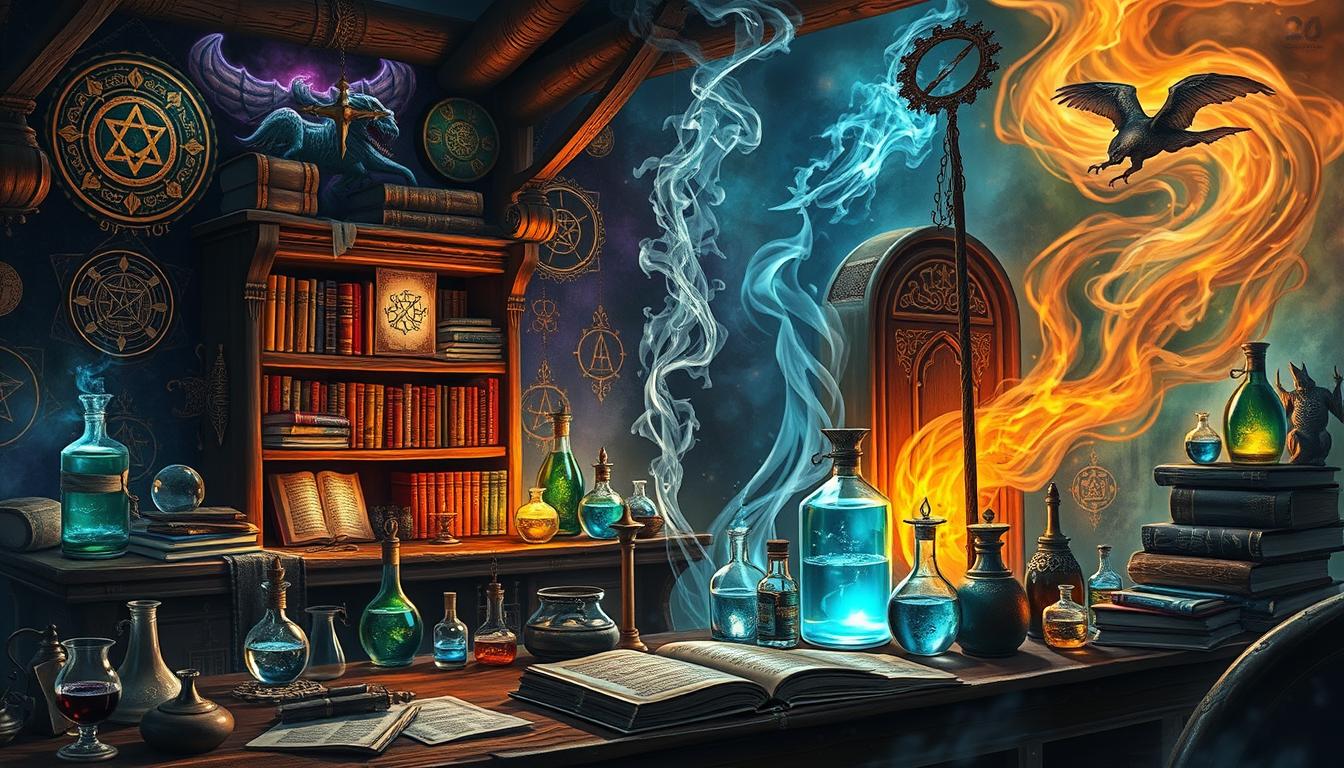Alchemy, an ancient protoscientific practice, has played a significant role in shaping the wizarding world of Harry Potter. From the creation of the legendary Philosopher’s Stone to the pursuit of immortality, alchemy has been a driving force behind many of the series’ most pivotal moments. But alchemy’s influence extends far beyond the realm of potions, permeating every aspect of magical life and transforming the very fabric of the wizarding world.
The roots of alchemy can be traced back thousands of years, with the Emerald Tablet serving as the foundation of alchemical philosophy. This cryptic text, which claims to reveal the secrets of the primordial substance and its transmutations, has guided alchemists throughout history in their quest for knowledge and power. The motto “As above, so below” encapsulates the alchemical belief in recreating heaven on earth through the secrets of the ancients.
In the world of Harry Potter, alchemy’s influence is felt in every corner of the wizarding world. From the halls of Hogwarts to the darkest corners of Knockturn Alley, the principles of alchemy shape the lives of witches and wizards alike. Whether it’s the creation of powerful magical objects, the development of transformative spells, or the pursuit of immortality, alchemy’s legacy is woven into the very fabric of the wizarding world.
Key Takeaways
- Alchemy is an ancient practice that combines elements of chemistry, physics, astrology, art, semiotics, metallurgy, medicine, mysticism, and religion.
- The Emerald Tablet serves as the foundation of alchemical philosophy, claiming to reveal the secrets of the primordial substance and its transmutations.
- Alchemy’s influence in the Harry Potter series extends far beyond potions, shaping every aspect of magical life in the wizarding world.
- The principles of alchemy guide the creation of powerful magical objects, the development of transformative spells, and the pursuit of immortality.
- Alchemy’s legacy is woven into the very fabric of the wizarding world, from the halls of Hogwarts to the darkest corners of Knockturn Alley.
The Ancient Roots of Alchemy in the Wizarding World
The magical world of Harry Potter is deeply intertwined with the ancient practice of alchemy, which has its roots in the distant past. Alchemy, a precursor to modern chemistry, played a crucial role in the development of Western science and was partially based on Renaissance traditions that influenced the magic depicted in J.K. Rowling’s beloved book series.
Tracing the Origins of Alchemy in Magical History
The origins of alchemy can be traced back thousands of years, potentially even predating the Agricultural Revolution. Some sources suggest that alchemy has connections to shamanism and metallurgy, and it was certainly known in ancient civilizations such as Sumer, Egypt, and Babylonia. As time passed, alchemy blended with metallurgy and divination, eventually evolving into a distinct philosophy with the advent of Christianity.
In the wizarding world, alchemy is offered as a specialized subject in the final two years at Hogwarts, highlighting its exclusivity and the potential demand among students. The primary goal of alchemy, both in the real world and in the Harry Potter universe, was to create the legendary Philosopher’s Stone, believed to have the power to turn all metals into gold and produce an elixir for eternal life.
The Emerald Tablet: The Foundation of Alchemical Philosophy
The Emerald Tablet, also known as the Smaragdine Table, The Secrets of Hermes, or Tabula smaragdina of Hermes Trismegistus, is the foundation of alchemical philosophy. This ancient text was translated into Greek by Alexandrian scholars and put on display in Egypt in 330 BC. According to legend, the Egyptian god Thoth built a Hall of Records, storing all the records of mankind from before the universal flood.
“That which is below is like that which is above, and that which is above is like that which is below, to perform the miracles of one only thing.” – The Emerald Tablet
The Emerald Tablet’s cryptic teachings have influenced alchemists for centuries, guiding their pursuit of the Philosopher’s Stone and the elixir of life. In the Harry Potter series, these alchemical principles are woven into the magical world, with characters like Nicolas Flamel, a famous alchemist featured fictionally in Harry Potter and the Philosopher’s Stone, embodying the ancient roots of this fascinating practice.
The Seven Stages of Alchemical Transformation
Alchemy, a practice that dates back more than 8,000 years, is not merely about transmuting base metals into gold. It is a spiritual journey that involves a three-fold transformation: physical, spiritual, and psychological. The seven stages of alchemical transformation represent the steps towards enlightenment and the transmutation of the soul.
- Calcination: The purification of the soul through the fires of self-discipline and sacrifice.
- Dissolution: The breaking down of the ego and the opening of the heart to divine wisdom.
- Separation: The sorting of the pure from the impure, the essential from the non-essential.
- Conjunction: The union of opposites, the marriage of the masculine and feminine aspects of the self.
- Fermentation: The inner transformation that occurs when the soul is infused with spiritual energy.
- Distillation: The concentration of the essence, the purification of the spirit.
- Coagulation: The manifestation of the divine in the physical world, the attainment of enlightenment.
These stages are not just a formula for the transmutation of matter, but a roadmap for personal growth and spiritual development. As the alchemist moves through each stage, they shed the impurities of the ego and open themselves to the divine wisdom that resides within.
“Alchemy is the art of transmuting the soul, of liberating the divine spark within each of us.”
The alchemical process requires years of study, devotion, and the mortification of the body to develop the soul and essence within. It is a journey that demands patience, perseverance, and a willingness to confront the shadows within oneself.
| Stage | Symbol | Meaning |
|---|---|---|
| Calcination | 🔥 | Purification through fire |
| Dissolution | 💧 | Breaking down of the ego |
| Separation | 🌬️ | Sorting the pure from the impure |
| Conjunction | 🌞🌙 | Union of opposites |
| Fermentation | 🍇 | Inner transformation |
| Distillation | 🧪 | Concentration of the essence |
| Coagulation | 💠 | Manifestation of the divine |
Through the seven stages of alchemical transformation, the practitioner seeks to achieve a state of enlightenment, a union with the divine that transcends the limitations of the physical world. It is a journey that requires courage, dedication, and a willingness to embrace the unknown.
Alchemy’s Goals and Objectives: Linking Harry Potter and Tom Riddle
The ancient practice of alchemy, which dates back to the mid-14th century with notable figures like Nicholas Flamel, aimed to achieve three primary goals: the creation of the Philosopher’s Stone, the attainment of immortality, and the spiritual enlightenment of the soul. These objectives are mirrored in the journeys of both Harry Potter and Tom Riddle (Lord Voldemort) throughout the Harry Potter series, particularly in the final novel, “Harry Potter and the Deathly Hallows.”

The Pursuit of the Philosopher’s Stone and Immortality
The Philosopher’s Stone, known as the Sorcerer’s Stone in the American editions of the Harry Potter books, is a legendary alchemical substance believed to turn base metals into gold and grant immortality to its possessor. In the series, both Harry and Voldemort seek the stone for different reasons: Harry to protect it from falling into the wrong hands, and Voldemort to achieve immortality and restore his body.
“The ancient study of alchemy is concerned with making the Philosopher’s Stone, a legendary substance with astonishing powers. The Stone will transform any metal into pure gold. It also produces the Elixir of Life, which will make the drinker immortal.” – Hermione Granger, Harry Potter and the Philosopher’s Stone
The Spiritual Enlightenment of the Soul in Alchemy
Alchemy also sought the spiritual enlightenment of the soul, a goal that parallels Harry’s journey of self-discovery and personal growth throughout the series. As he faces challenges and overcomes obstacles, Harry undergoes a transformative process similar to the alchemical stages of nigredo (blackening), albedo (whitening), and rubedo (reddening), ultimately leading to a more enlightened state.
The Creation of Life: Homunculi and Golems
The creation of artificial life, such as homunculi and golems, was another aim of alchemists. In the Harry Potter series, this concept is embodied in Voldemort’s creation of Horcruxes—objects containing fragments of his soul—which grant him a form of immortality. The destruction of these Horcruxes becomes a crucial part of Harry’s quest to defeat Voldemort.
| Alchemical Goal | Harry Potter’s Journey | Tom Riddle’s Journey |
|---|---|---|
| Philosopher’s Stone | Protecting the stone from Voldemort | Seeking the stone for immortality |
| Immortality | Accepting mortality and the cycle of life | Pursuing immortality through Horcruxes |
| Spiritual Enlightenment | Undergoing personal growth and transformation | Rejecting spiritual growth in favor of power |
| Creation of Life | Destroying Horcruxes to defeat Voldemort | Creating Horcruxes as a form of artificial life |
The alchemical themes woven throughout the Harry Potter series, especially in “Harry Potter and the Deathly Hallows,” highlight the profound influence of this ancient practice on the narrative. By drawing parallels between the goals of alchemy and the journeys of its central characters, J.K. Rowling crafts a compelling story that resonates with readers on both a magical and philosophical level.
The Elixir of Life: Alchemy’s Ultimate Achievement
Throughout the centuries, alchemists have sought to create the legendary Elixir of Life, a potion believed to grant immortality to those who consume it. This ultimate goal of alchemy has captured the imagination of people across the globe, from ancient times to the present day. The Elixir of Life represents the pinnacle of alchemical achievement, offering the promise of eternal life and the transformation of the human condition.
The Powers and Limitations of the Elixir of Life
The Elixir of Life is said to possess the power to grant immortality to those who drink it regularly. However, while the Elixir can extend life indefinitely, it does not prevent the body from aging. As a result, those who rely on the Elixir for prolonged life may find themselves becoming increasingly dependent on its effects. Additionally, if a person consuming the Elixir ages beyond their natural lifespan and then ceases to drink it, they will face inevitable death.
Despite these limitations, the Elixir of Life remains a potent symbol of alchemy’s transformative potential. In addition to granting immortality, the Elixir is believed to have the ability to restore a disembodied soul to a physical body, making it a highly sought-after substance for those seeking to cheat death or resurrect loved ones.
Nicolas Flamel and the Philosopher’s Stone
The most famous historical figure associated with the Elixir of Life is Nicolas Flamel, a French scribe and manuscript-seller who lived in the 14th century. According to legend, Flamel discovered the secret to creating the Philosopher’s Stone, the key ingredient in the Elixir of Life. Flamel and his wife, Perenelle, are said to have used the Elixir to extend their lives for centuries, becoming immortal beings.
While the historical accuracy of Flamel’s story is debatable, his legend has persisted through the ages, inspiring countless works of literature and popular culture. The tale of Nicolas Flamel and the Philosopher’s Stone has become synonymous with the quest for immortality and the transformative power of alchemy.
“The Philosopher’s Stone is a legendary substance, allegedly capable of turning inexpensive metals into gold. It was sometimes believed to be an elixir of life, useful for rejuvenation and possibly for achieving immortality.” – Wikipedia
The Elixir of Life and the Philosopher’s Stone remain central to the mythology and symbolism of alchemy. They represent the ultimate goal of the alchemical process: the transformation of the human condition and the attainment of immortality. While the historical existence of these substances remains unproven, their enduring presence in our collective imagination serves as a testament to the timeless allure of alchemy and its promise of eternal life.
Alchemical Symbolism in the Harry Potter Series
The Harry Potter series is rich with alchemical symbolism, weaving intricate themes and motifs throughout the narrative. From the Philosopher’s Stone to the Elixir of Life, J.K. Rowling masterfully incorporates alchemical concepts into her magical world, adding depth and meaning to the characters’ journeys.
Alchemy plays a critical role in setting the parameters and internal logic of the Harry Potter series. Few critics have addressed alchemy as a significant theme in J.K. Rowling’s seven-part narrative, despite its undeniable presence. John Granger outlines the strong influence of alchemy on the first five novels in the series, focusing on alchemical symbolism and the parallels to alchemical stages.
The Philosopher’s Stone and the Elixir of Life
The Philosopher’s Stone, a central element in the first book, serves as a powerful metaphor for self-actualization and spiritual enlightenment. In alchemy, the Philosopher’s Stone is the ultimate goal, capable of transforming base metals into gold and granting immortality through the Elixir of Life. This concept appears in various works, such as Faust, A Little White Horse, and Magic Mountain, and is a significant motif in the Harry Potter series.
The quest for the Philosopher’s Stone mirrors Harry’s journey of self-discovery and growth. The stone represents the wisdom and courage he must acquire to face his challenges and fulfill his destiny. The Elixir of Life, derived from the stone, symbolizes the eternal nature of the soul and the pursuit of spiritual immortality.
The Rebirth and Transformation of Characters
Character transformation is a recurring theme in the Harry Potter series, with the most significant transformations occurring in the final book, Deathly Hallows. Hallows functions as the Rubedo novel of the series, representing the complete alchemical cycle (Nigredo, Albedo, Rubedo) within itself.
Harry’s journey from the “base metal” of his humble beginnings to the “gold” of his heroic destiny exemplifies the alchemical process of purification and enlightenment. Similarly, Severus Snape’s redemption arc, from darkness to light, showcases the transformative power of love and sacrifice, mirroring the alchemical principles of transmutation.
| Character | Alchemical Symbolism | Transformation |
|---|---|---|
| Harry Potter | The Philosopher’s Stone, Golden Snitch | From humble beginnings to heroic destiny |
| Severus Snape | Transmutation, Redemption | From darkness to light through love and sacrifice |
| Hermione Granger | Soror Mystica, Partnership | Supporting Harry’s journey and personal growth |
The dynamic between Harry, Hermione, and Ron receives much attention in Deathly Hallows, highlighting the importance of partnership and support in achieving self-actualization. Hermione’s role as a soror mystica, or female partner, to Harry emphasizes the alchemical principle of balance and the necessity of unity in the pursuit of enlightenment.
“Alchemy, as a philosophical and spiritual tradition, presents a model of self-perfection in which the individual can liberate and refine the divine self in order to apprehend truth and perfection.”
– Kate Behr, The Dynamic of Transformation in the Harry Potter Series
The alchemical symbolism in the Harry Potter series enriches the narrative, providing a deeper understanding of the characters’ journeys and the universal themes of growth, transformation, and the pursuit of wisdom. Through the lens of alchemy, readers can appreciate the intricate tapestry of meaning woven throughout the series, elevating it from a simple fantasy tale to a profound exploration of the human experience.
Beyond Potions: Alchemy’s Influence on Magical Objects and Spells
The influence of alchemy in the wizarding world extends far beyond the creation of potions. Alchemy has played a significant role in shaping various magical objects and spells that are integral to the Harry Potter universe. From the Philosopher’s Stone to the Deathly Hallows, alchemical principles have been woven into the fabric of the magical world, imbuing objects with extraordinary powers and symbolism.
One of the most prominent examples of alchemy’s influence on magical objects is the Philosopher’s Stone. This legendary object, created through alchemical processes, has the power to transform any metal into pure gold and produce the Elixir of Life, which grants immortality to its drinker. The Philosopher’s Stone serves as a central plot device in the first Harry Potter book, highlighting the significance of alchemical pursuits in the wizarding world.
Another set of magical objects that carry alchemical symbolism are the Deathly Hallows. Comprising the Elder Wand, the Resurrection Stone, and the Cloak of Invisibility, these artifacts represent the three stages of alchemical transformation: nigredo (blackening), albedo (whitening), and rubedo (reddening). Each Hallow embodies a different aspect of the alchemical quest for immortality and spiritual enlightenment, making them highly sought-after items in the wizarding world.
Alchemy’s influence also extends to the realm of spells. The Patronus Charm, for instance, can be seen as a manifestation of the alchemical principle of light triumphing over darkness. This powerful spell, which conjures a protective guardian in the form of an animal, is fueled by positive emotions and memories, symbolizing the alchemical process of purification and the triumph of the soul over adversity.
| Magical Object/Spell | Alchemical Symbolism |
|---|---|
| Philosopher’s Stone | Transformation, Immortality |
| Elder Wand | Nigredo (Blackening) |
| Resurrection Stone | Albedo (Whitening) |
| Cloak of Invisibility | Rubedo (Reddening) |
| Patronus Charm | Light Triumphing Over Darkness |
The intertwining of alchemy with magical objects and spells in the Harry Potter series demonstrates the profound impact that this ancient practice has had on the wizarding world. By infusing objects with alchemical properties and imbuing spells with alchemical symbolism, J.K. Rowling has created a rich and layered universe that pays homage to the timeless principles of transformation, purification, and the pursuit of knowledge.
The Influence of Alchemy in the Wizarding World: Beyond Potions
While alchemy’s influence on Potions is well-known in the wizarding world, its impact extends far beyond the confines of cauldrons and brewing. Alchemy serves as a unifying theme throughout the Harry Potter universe, shaping not only the magical elements of the story but also the character arcs and overarching narrative.
Alchemy as a Unifying Theme in the Harry Potter Universe
The principles of alchemical transformation – the purification and transmutation of the soul – are reflected in the journeys of key characters like Harry, Ron, and Hermione. As they grow, mature, and overcome challenges, their personal development mirrors the stages of the alchemical process. This unifying theme of transformation and growth is woven throughout the series, creating a cohesive narrative that resonates with readers.
Alchemical symbolism is also present in the series’ central conflict between good and evil. Harry and Voldemort represent the opposing forces of light and darkness, with the Philosopher’s Stone and the Horcruxes embodying the pursuit of immortality through different means. This symbolic representation of the duality in alchemy adds depth and complexity to the story, making it more than just a tale of magical adventures.
The Significance of Alchemical Principles in Character Development
The characters in the Harry Potter series undergo significant transformations, both physically and emotionally, throughout their journeys. These transformations often align with the principles of alchemy, such as the purification of the soul and the transmutation of base elements into something more precious.
| Character | Alchemical Principle | Transformation |
|---|---|---|
| Harry Potter | Purification of the Soul | Overcoming personal struggles and facing his destiny |
| Ron Weasley | Transmutation of Base Elements | Growing from an insecure sidekick to a loyal and brave friend |
| Hermione Granger | Transformation through Knowledge | Evolving from a know-it-all to a wise and compassionate witch |
| Neville Longbottom | Rebirth and Renewal | Transforming from a timid boy to a courageous leader |
By incorporating alchemical principles into character development, J.K. Rowling creates a rich and multi-layered story that resonates with readers on a deeper level. The transformative power of alchemy becomes a metaphor for the characters’ personal growth and the universal human experience of change and self-discovery.
The Intersection of Alchemy and Dark Magic
In the Harry Potter series, the realms of alchemy and dark magic intertwine in a sinister dance, as the villainous Voldemort seeks to attain immortality through nefarious means. While alchemy is traditionally associated with the pursuit of spiritual enlightenment and the creation of the legendary Philosopher’s Stone, Voldemort perverts these noble goals by delving into the darkest depths of magic.
Voldemort’s quest for eternal life leads him to create Horcruxes, objects imbued with fragments of his shattered soul. By splitting his soul through acts of murder and encasing the pieces within these dark artifacts, Voldemort believes he can achieve a twisted form of immortality. This perversion of alchemy’s principles goes against the fundamental tenets of the craft, which emphasize the purification and unity of the soul.
Voldemort’s Quest for Immortality and the Horcruxes
Voldemort’s obsession with cheating death drives him to explore the darkest corners of magic, leading him to discover the secret of creating Horcruxes. By committing heinous acts of murder, Voldemort splits his soul into multiple pieces, each stored within a carefully chosen object. These Horcruxes serve as anchors, tethering his essence to the mortal world and granting him a form of immortality as long as they remain intact.
However, this path to eternal life comes at a terrible cost. The creation of Horcruxes requires the most vile and unforgivable acts, tearing the soul asunder and corrupting the very essence of the creator. Voldemort’s pursuit of immortality through this dark magic ultimately leads to his downfall, as the fragmentation of his soul renders him increasingly unstable and vulnerable.
“I, who have gone further than anybody along the path that leads to immortality. You know my goal – to conquer death.” – Lord Voldemort
In contrast to the alchemical ideal of achieving immortality through spiritual means, such as the creation of the Elixir of Life, Voldemort’s method is a twisted and corrupted form of alchemy. By using dark magic to split his soul and create Horcruxes, he violates the fundamental principles of the craft, which seek to purify and unify the soul in the pursuit of enlightenment.
The intersection of alchemy and dark magic in the Harry Potter series serves as a cautionary tale, illustrating the dangers of pursuing immortality at any cost. Voldemort’s downfall demonstrates that the path to eternal life through dark magic is a false and destructive one, leading only to ruin and despair.
Albus Dumbledore: The Alchemical Sage
In the enchanting world of Harry Potter, Albus Dumbledore stands as a beacon of wisdom and guidance, embodying the archetype of the alchemical sage. Born between August 16 and 31, 1881, in Mould-on-the-Wold, England, Dumbledore’s life was a tapestry woven with the threads of alchemy, leadership, and unwavering dedication to the greater good.

Dumbledore’s Wisdom and Guidance in Harry’s Journey
Throughout Harry’s journey, Dumbledore serves as a mentor, offering invaluable wisdom and guidance. His deep understanding of alchemical principles is evident in his teachings, as he emphasizes the power of love, sacrifice, and the significance of choice. Dumbledore’s words resonate with timeless truth:
“It is our choices, Harry, that show what we truly are, far more than our abilities.”
As Harry navigates the challenges of the wizarding world and his own destiny, Dumbledore’s guidance proves instrumental, helping the young wizard understand the complexities of life and the importance of standing up for what is right.
The Parallels Between Dumbledore and Historical Alchemists
Albus Dumbledore’s life and achievements mirror those of historical alchemists, particularly Nicolas Flamel, with whom he collaborated extensively. Like Flamel, Dumbledore sought knowledge and enlightenment through alchemical pursuits, as evidenced by his groundbreaking contributions to the field:
- Discovering twelve different uses for dragon’s blood
- Receiving the gold medal for Groundbreaking Contribution to the International Alchemical Conference in Cairo
- Working with Nicolas Flamel on alchemy and the Philosopher’s Stone
Dumbledore’s alchemical expertise extended beyond the realm of potions, influencing his role as a wise and powerful wizard. His defeat of the dark wizard Gellert Grindelwald in an epic duel and his mastery of the Elder Wand from 1945 to 1997 underscore his exceptional magical abilities, rivaling those of historical alchemists.
| Albus Dumbledore | Historical Alchemists |
|---|---|
| Discovered 12 uses for dragon’s blood | Sought the Philosopher’s Stone and Elixir of Life |
| Collaborated with Nicolas Flamel on alchemy | Pursued knowledge and enlightenment through alchemical studies |
| Possessed the Elder Wand, a powerful magical object | Crafted magical objects and sought to understand the mysteries of the universe |
In his role as Headmaster of Hogwarts, Dumbledore’s wisdom and guidance extended to the entire school, as he tirelessly worked to protect and nurture the young witches and wizards under his care. His legacy, like that of the great alchemists before him, continues to inspire and enlighten generations of wizards, reminding us all of the transformative power of wisdom, love, and the relentless pursuit of knowledge.
The Lasting Legacy of Alchemy in the Wizarding World
The influence of alchemy in the wizarding world extends far beyond the pages of the Harry Potter series, leaving an indelible mark on the magical community and captivating readers for generations. The principles of transformation, purification, and the relentless pursuit of knowledge that lie at the heart of alchemy continue to shape the very fabric of the magical realm, long after the events chronicled in the books have concluded.
The enduring presence of legendary figures like Nicholas Flamel, the creator of the Philosopher’s Stone, and the enigmatic Deathly Hallows in wizarding history and lore serves as a testament to the profound impact of alchemy on the magical world. These symbols of alchemy’s power and potential have become woven into the tapestry of the wizarding world, inspiring generations of witches and wizards to delve deeper into the mysteries of their craft.
“The ancient study of alchemy is concerned with making the Philosopher’s Stone, a legendary substance with astonishing powers. The Stone will transform any metal into pure gold. It also produces the Elixir of Life, which will make the drinker immortal.”
– J.K. Rowling
Moreover, the alchemical themes and symbolism that permeate the Harry Potter series have resonated profoundly with readers, encouraging them to explore the hidden depths and life lessons that lie beneath the surface of the story. The transformative journey of Harry Potter himself, from an orphaned boy to a powerful wizard, mirrors the alchemical process of transformation and self-discovery, inspiring readers to embark on their own personal quests for growth and enlightenment.
| Alchemical Concept | Manifestation in Harry Potter | Lasting Impact |
|---|---|---|
| Philosopher’s Stone | Created by Nicolas Flamel, grants immortality and wealth | Represents the ultimate goal of alchemy, inspires the pursuit of knowledge and power |
| Transformation | Harry’s journey from orphan to powerful wizard | Mirrors the alchemical process of self-discovery and personal growth |
| Purification | The destruction of Horcruxes to cleanse Voldemort’s soul | Highlights the importance of spiritual purification and the triumph of good over evil |
The lasting legacy of alchemy in the wizarding world is a testament to the enduring power of J.K. Rowling’s vision and the timeless appeal of the Harry Potter series. By seamlessly weaving the principles of this ancient art into the fabric of her magical universe, Rowling has created a world that continues to captivate and inspire readers, inviting them to embark on their own alchemical journeys of transformation and self-discovery.
Conclusion
In the enchanting world of Harry Potter, the influence of alchemy extends far beyond the mere creation of potions. This ancient practice, with its roots stretching back thousands of years, has left an indelible mark on the very fabric of the wizarding world. From the pursuit of the legendary Philosopher’s Stone to the symbolic transformation of characters throughout their journeys, alchemy weaves itself into the tapestry of the story, adding depth and meaning to the magical universe created by J.K. Rowling.
The seven stages of alchemical transformation find their parallels in the lives of Harry, his friends, and even his enemies, as they navigate the complexities of magic, morality, and personal growth. The Philosopher’s Stone, the ultimate goal of alchemy, serves as a powerful symbol of immortality and the quest for eternal life, while the Elixir of Life represents the pinnacle of alchemical achievement. These elements, along with the rich symbolism present in the series, invite readers to explore the deeper mysteries and truths hidden within the pages of the Harry Potter books.
As we delve into the intersection of alchemy and dark magic, we witness the corrupting influence of the desire for power and immortality, exemplified by characters like Voldemort and his creation of the Horcruxes. In contrast, Albus Dumbledore emerges as an alchemical sage, guiding Harry through his journey and embodying the wisdom and principles of the great alchemists of history. Through these characters and their experiences, the lasting legacy of alchemy in the wizarding world is firmly established, reminding us of its enduring power and relevance, both within the fictional realm and in our own understanding of the world around us.



